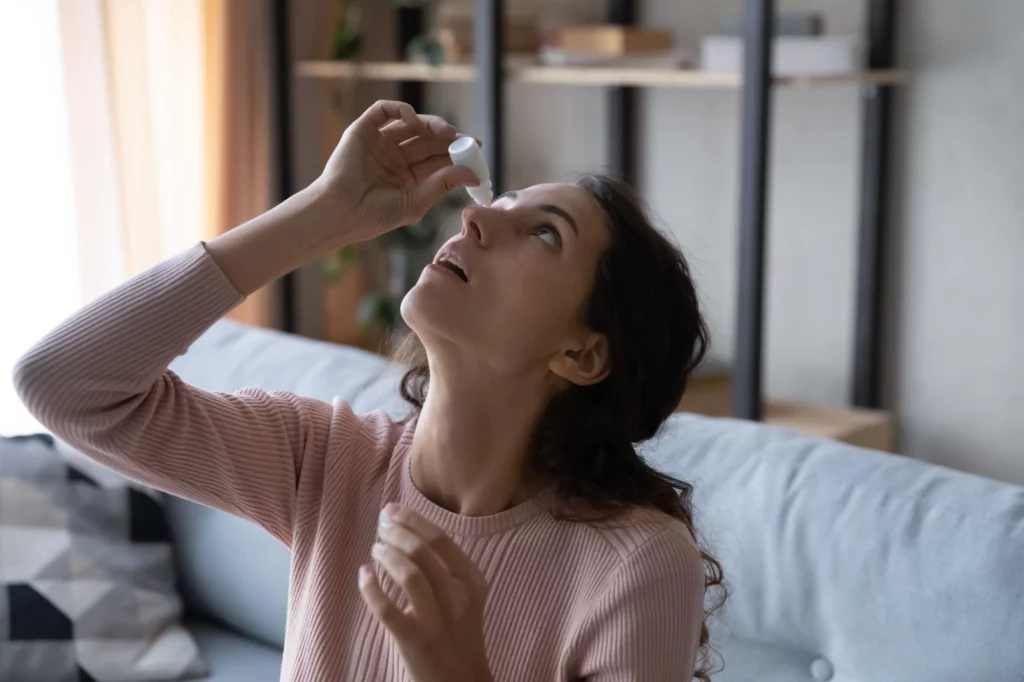Medically Reviewed by: Edward C. Wade, M.D., F.A.C.S.
Common Eye Problems in the Winter
Common eye problems in the winter might be easy to ignore at first. However, ignoring symptoms like light sensitivity or itchy eyes in the winter can lead to other conditions like dry eye syndrome or, in extreme cases, abrasions of the corneal surface.
As the temperature drops, be on the lookout for winter eye problems including burning, dry, or itchy eyes, redness, light sensitivity, eye fatigue, the sensation of having an object in your eye, discomfort wearing contact lenses, and/or the appearance of eye mucus.
Don’t allow dry eyes to take away from time spent with family and friends throughout this winter. Learn about what can agitate your eyes in winter, how to identify your symptoms, and how to treat them.
5 winter eye problems
1. Dry eyes
The winter air is often drier than the air during the rest of the year, even in Texas, causing your eyes to dry out. To make matters worse, most of us opt to kick up our heaters during the cooler days, drying the air out even more.
Is dry eye dangerous? If left untreated, dry eyes can lead to a scratched eye ball, corneal ulcers, and vision loss. That said, there are steps you can take to prevent dry eyes in the winter such as staying well hydrated, using a humidifier, and not sitting directly in front of hot air.
2. Red, itchy eyes
Whether it’s a result of dry air, thick snow flurries, or brutal winds, most find that their eyes are sensitive to cold air, leaving them with dry and itchy eyes in the winter. If you’re finding that your eyes are red and itchy you can try over-the-counter (OTC) hydrating eye drops, but if you notice that those do not help, or your eyes tend to be itchy indoors, you may want to ask your eye doctor about allergies.
3. Excessive tearing
Winter winds and cold temperatures can sometimes cause your eyes to produce excessive tears, leaving you with watery eyes. If you experience excess tearing while you’re outside, you can try wearing sunglasses to help block your eyes from snow or chilly winds.
4. Sensitivity to light
Winter light sensitivity might not be a huge deal in Texas, but if you travel to snowy states you may find that your eyes are red and sensitive to light. Even when it’s not sunny, daylight can bounce off of the white snow or ice and cause sensitivity in your eyes. To help winter light sensitivity, try wearing polarized sunglasses when you’re outside.
5. UV damage/sunburn
Yes, your eyes can get sunburned! Similar to above, sunlight can reflect off the snow or ice into your eyes and can cause sunburn. Sunburned eyes cause symptoms like increased light sensitivity, irritation, or eye fatigue — and pain and is especially common at higher altitudes, because you are closer to the sun.
If you suspect that you have a sunburn in your eyes, call your eye doctor for treatment. If left untreated, repeatedly sunburned eyes can lead to macular degeneration, cornea damage, or vision loss.
Why are my eyes so dry in the winter?
When we think about dry eyes in winter, the first thing that comes to mind is the cold, but does the cold weather make your eyes dry? And if so, are your dry eyes worse in the winter than they are in other seasons?
The air during cold weather contains less moisture than warmer air. When the air is rid of moisture, the tears that keep the surface of your eyes moist are more likely to evaporate quickly. Winter winds can exacerbate these conditions, but it’s not only the cold that can cause dry eyes in winter; heat may also be to blame. The fires and heaters we use to warm up our bodies can make the air inside drier than it is outside. Even the powerful vents in your car’s heater can be bad for dry eyes in winter.
Dry eyes in winter can be made worse by the same behaviors that cause chronic dry eye syndrome. The following actions will increase your susceptibility to dry eyes regardless of the season.
- If you don’t wear proper eye protection, UV light eye damage can exacerbate the symptoms of dry eye. In the winter, the glare of sunlight on the snow can be especially problematic.
- Do you overwear your contact lenses? Doing so increases the likelihood that you will suffer from dry eyes. However, some contact-related dry eye symptoms are unavoidable under certain circumstances, such as when you wear contacts after LASIK.
- If you spend hours staring at a screen, chances are that you experience eye strain from cell phone and computer use. When we concentrate on these devices, we tend to blink less, which ultimately encourages the faster evaporation of your tears.
- Certain autoimmune diseases, medications, age, and your gender can also affect your susceptibility to dry eyes.
Continue reading: Is UV light bad for your eyes?
How to prevent common eye problems in winter
Find yourself asking, “why are my eyes worse in the winter?” With the dry air, wind, and heaters, it can sometimes feel as if there’s no respite from winter eye problems. However, there are steps you can take to reduce your symptoms and find relief. Here are some of the top suggestions for how to prevent common issues, such as dry eyes, in the winter:
- Keep your hands away from your eyes. Rubbing dry eyes will only worsen the problem.
- Use over-the-counter (OTC) eye drops to provide moisture to your eyes.
- If your symptoms persist, visit your eye doctor and have them check on your dry eyes. Your doctor can help you find the best eye drops for your winter dry eyes. They can also recommend more extensive procedures, such as the insertion of punctal plugs (tear duct plugs).
- Wear protective eyewear. Especially if you participate in winter sports, such as skiing.
- Replace your contact lenses regularly and/or invest in contacts for people with dry eyes.
- Invest in a humidifier. A humidifier can help counteract the dry air inside your home by adding moisture back into the air.
- Avoid positioning yourself in front of blowing hot air. Keep the car vents turned away from your face, and sit further away from the vents and fireplace in your home.
- Put down the phone and turn off your computer. If you need to check these devices for work, then take regular blink breaks, and consider installing an app that reminds you to look away from your screen.
Continue reading: How to treat digital eye strain
Find long-term relief from common winter eye problems at Eye Center of Texas
The holidays should be a time for family and friends, not dry eyes. So, the sooner you address these common eye problems in winter, the sooner you’ll find relief, and the less your dry or itchy eyes in the winter will bother you next season. With experienced doctors and six convenient locations, Eye Center of Texas has everything you need to find relief from dry eyes.
Call Eye Center of Texas at 713-797-1010, or request an appointment online today.
More Helpful Articles by Eye Center of Texas:
-
- Do I Need Reading Glasses?
- Lasik vs Contacts: Which is Best for You
- What to Expect Before and After LASIK Surgery
- When is a Corneal Transplant Necessary?
- Is Cornea Transplant Surgery Painful?
Related Articles
Financing Options Available
Apply today to find a financing option that meets your needs.
Our Locations
Houston/Bellaire
6565 W. Loop S., Suite 650Bellaire, TX 77401
Medical Office:
713-797-1010
Medical Fax:
713-357-7276
LASIK/Near Vision:
Office: 713-395-1515
Fax: 713-357-7278
Pasadena
4415 Crenshaw RoadPasadena, TX 77504
Medical Office:
281-977-8800
Medical Fax:
281-977-8877
Sugar Land
15200 S.W. Freeway, Suite 130Sugar Land, TX 77478
Medical Office:
281-277-1010
Medical Fax:
281-277-4504
Clear Lake
455 E. Medical Center Blvd., Suite 110Webster, TX 77598
Medical Office:
281-332-1397
Medical Fax:
281-282-9152
Katy
Greenhouse Medical Plaza2051 Greenhouse Road, Suite 110
Houston, TX 77084
Medical Office:
346-547-7070
Medical Fax:
281-214-2971
The Woodlands/Conroe
100 Medical Center Blvd., Suite 118Conroe, TX 77304
Medical Office:
936-647-1610
Medical Fax:
936-647-1620


